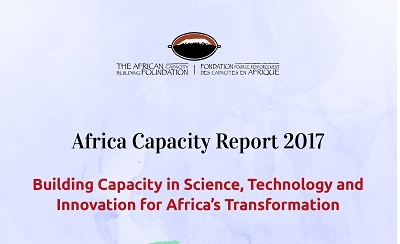
… Insightful ACBF Capacity Report to plot the way forward – launching 28 March
Harare (Zimbabwe), March 2017 (ACBF) - The African Capacity Building Foundation (ACBF) is gearing up for a multiple location launch of the 6th edition of its flagship publication – The Africa Capacity Report (ACR) on 28 March 2017. This year’s report which is based on empirical studies carried out in 44 African countries, focuses on “Building Capacity in Science, Technology and Innovation for Africa’s Transformation” and is meant to give clear pointers on what the continent has to do to leverage the huge potential of science, technology and innovation (STI) to become economically competitive.
Speaking ahead of the main launch which will be held at Centre International de Conférence Abdou Diouf (CICAD) from 12H30 local time in Dakar in the context of this year’s African Development Week convened by the African Union Commission and the UN Economic Commission for Africa, ACBF’s Executive Secretary – Prof. Emmanuel Nnadozie – outlined some of the motivating factors that have warranted the research and policy advisory document:
“Even though two-thirds of African countries have STI policies and strategies, their capacity, to implement them, remains very low,” he said.
“In fact the ACBF’s recent findings have shown that the continent has a huge shortage of 4.3 million engineers and 1.6 million agricultural scientists and researchers.
“Most African countries have underdeveloped STI institutions and fail to effectively generate and deploy knowledge and technological innovations for socioeconomic development. You would notice this in how STI institutions are inadequately staffed with skills, expertise, financial resources, infrastructural capabilities, and equipment,” he added.
The report is expected to galvanize African leaders, who have shown huge interest in fostering science, technology, and innovation (STI)-led development in the coming years, to implement their commitments, moving forward. This commitment was clearly expressed by the adoption of a 10-year Science, Technology, and Innovation Strategy for Africa (STISA-2024) in June 2014 at the 23rd Ordinary Session of African Union Heads of State and Government Summit. The strategy links science, technology, and innovation to Africa’s sustainable economic transformation. Developing the right capacities for institutions and individuals together with the investment needed for such capacity to be retained and utilised in Africa is, therefore, crucial.
Multi-location launch
While ACBF will be distilling the key messages from the Report at the launch in Dakar, the Foundation and its partners will engage a wide-range of audiences in simultaneous launches in Harare (Zimbabwe) which hosts its headquarters as well as in its West/Central Africa Regional Office in Accra (Ghana). Other African locations where launches have been earmarked include: Abuja (Nigeria), Addis Ababa (Ethiopia), Dar es Salaam (Tanzania), Kigali (Rwanda), Lomé (Togo), Rabat (Morocco), and Yaounde (Cameroon).
The Foundation has also secured the support of its partner – International Idea for a launche in Stockholm.
The ACR launch will bring together government officials, other decision makers, experts, researchers, civil society and private sector actors as well as the media and decision makers concerned with science, technology and innovation in Africa to facilitate exchange of lessons, experiences and action points.
-ENDS HERE-
For more information, please contact:
Abel Akara Ticha – Senior Communication Officer
The African Capacity Building Foundation
Harare, Zimbabwe
+263 7+263-4 304663, 304622, 332002, 332014; Ext. 279
Email: [email protected]
About the African Capacity Building Foundation
Established in 1991, ACBF builds human and institutional capacity for good governance and economic development in Africa. To date the Foundation has empowered people in governments, parliaments, civil society, private sector and higher education institutions in more than 45 countries and 6 regional economic communities. ACBF supports capacity development across Africa through mobilization and leveraging of resources for capacity development; grants, investments and fund management; knowledge services; promoting innovation in capacity development and capacity development advisory services. The establishment of ACBF was in response to the severity of Africa’s capacity needs, and the challenges of investing in indigenous human capital and institutions in Africa. ACBF interventions are premised on four principles: the centrality of capacity to the development process in Africa; the critical role of a partnership and demand-driven approach in tackling capacity challenges; African ownership and leadership in the capacity development process; and a systematic, sequenced and coordinated approach to the capacity development process that pays attention to capacity retention and utilization. For further information go to: www.acbf-pact.org





